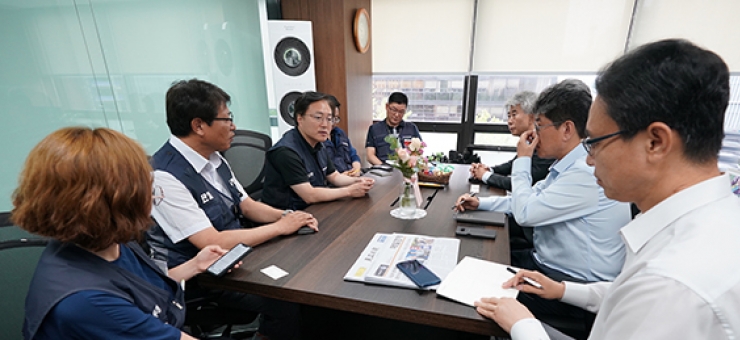News
Korea - KFIU forms task force to ensure application of Industry Collective Agreement

With effect from July 2019, the Korean labour law will cap the weekly working hours to 52 hours per week – inclusive of a maximum of 12 hours overtime. It will be applied to companies employing 300 workers or more. The Korea Finance Industry Union (KFIU) has led the charge to demand the implementation of a 5-day work week system since 2012, one year before the national guidelines was announced. This time again, the union is determined to take a leading role to facilitate the introduction of the 52 working hour system in Korea.
In 2018, the KFIU and Korea Bankers Association concluded a Collective Bargaining Agreement which included the promise of a 52 hours work week from January this year. The CBA also effectively covers 33 items of concern such as: no work computers should be operated during designated lunch hours, all pregnant women staff must be allowed to reduce 2 working hours per day, bank managements should reduce or simplify the Key Performance Index (KPI) and to stop the use of Mystery Shopping to monitor bank tellers.
Earlier in May this year, the KFIU formed a special task force known as the Workplace Investigation Team (WIT), which is made up of 44 members from 30 workplaces. KFIU’s affiliate, the KB Bank Union, had piloted six years ago their own internal workplace investigation team with two full time union officials who monitored management practices to flag unfair labour practices or any deterioration of working conditions. Any union member could inform the unit which would initiate an investigation and to make recommendations to correct the situation.
The first action of the new task force was to develop a check list to assess the CBA’s implementation of three identified priority issues i.e. working hour reduction, emotional labour protection, and prohibition of excessive competition.
Bro. Yoo Joo-Sun, General Secretary of KFIU and head of Workplace Investigation Team said, “Since 2001, all local banks have transformed into financial holding companies and have experienced increased competition to retain their market share. This intensified the use of individual performance appraisals at the individual bank level in order to “motivate” employees. This trend has rendered the public values of financial institutions weaker and meaningless, and has a negative impact for the financial consumers. Bank employees were forced to survive to meet high sales target by selling consumers to the maximum level.
“The stress among the bank workers resulted in higher rates of chronic diseases, depression, and deaths from suicide. Bank workers recorded the second highest rate of occupational diseases after the construction industry in Korea. Last year, after many rounds of negotiations, the KFIU and Korea Bankers Association finally reached an agreement to resolve the long lasting problems of overwork and stressful works due to the prevailing individual over-competitive environment rather than group cooperation.”
The KFIU’s WIT is currently compiling a report based on their first visit to workplaces in June which is expected to be completed by July. Their initial findings indicated that the 52 working hour system has been implemented in 24 workplaces out of the total of 27 unions covered. However, only 3 workplaces have installed automatic machine system to track or validate the real working time of workers. Nine unions reported that the overtime work payment has yet to be properly implemented. Some unions shared that union members may avoid reporting the actual overtime worked as they are afraid of negative repercussion from supervisors. They also reported that the Industrial Bank of Korea extended Child Care leave from the existing 2 years to 3 years. The task force suggested that the bank management should instead increase their new hiring in order to fully apply the 52 working hour system.

